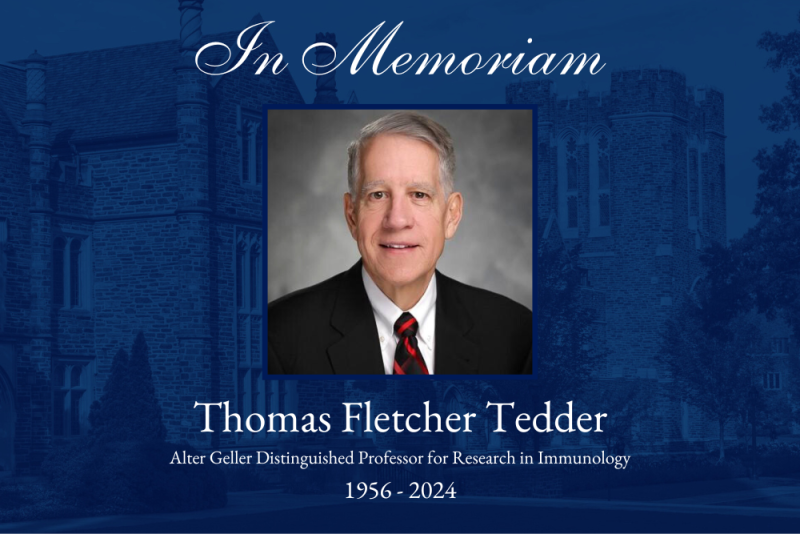
Tom Tedder was born in 1956 and grew up in northern Florida. He attended the University of Florida where he first embarked in a career in research, publishing several papers focused on applied microbiology even before entering graduate school. Tedder then pursued a doctorate at the University of Alabama, Birmingham, under the mentorship of Max Cooper. At UAB his passion for immunology was truly ignited. He immersed himself in understanding the molecular events leading to the activation of B cells and his exceptional productivity and collaborative approach to science set the stage for a remarkable career as an immunologist.
In 1985, Tedder moved to Harvard University and the Dana-Farber Cancer Institute, one of the world's leading institutions for cancer research and treatment. His research interests expanded as he delved deeper into the molecular mechanisms of B cell activation and autoimmunity. Collaborating with luminaries in immunology such as Stuart Schlossman and Doug Fearon, Tedder's work yielded groundbreaking insights into the role of B cell surface molecules and signaling pathways in B cell function. His research on CD20, CD19, and other B cell-associated molecules paved the way for the development of novel therapeutic strategies targeting B cells in autoimmune diseases and cancer.
Tedder's time at Harvard was characterized by a spirit of collaboration and he thrived in an environment that fostered interdisciplinary interactions. He collaborated with colleagues across diverse fields to tackle all aspects of lymphocyte biology, which is exemplified by his prolific output of scientific papers (>70) during this period. As Tedder's reputation as a leading immunologist grew, so did his influence within the scientific community. His discoveries, the tools he generated, and new research methods he developed earned him widespread recognition, solidifying his position as a trailblazer in B cell immunology.
In 1993, Tedder was recruited to Duke University as the founding chair of the new Department of Immunology. Tedder's tenure at Duke marked a pivotal moment in his career and for immunity-related sciences at our institution. He brought with him a wealth of scientific expertise and a vision for establishing a world-class center for immunological research and education. Under his leadership, the department attracted top-tier talent. He invested time and energy building the next generation of immunologists, providing guidance, support to students and junior faculty members alike.
His time as Chair of Immunology was marked by numerous achievements, including the establishment of Duke's Autoimmunity Center of Excellence. He remained a prolific researcher with over 200 research articles published during his tenure as department Chair. His pioneering research into B cell biology led to the development of inebilizumab (Uplinza), an anti-CD19 monoclonal antibody. Inebilizumab represents a significant advancement in the treatment of autoimmune diseases, particularly neuromyelitis optica spectrum disorder (NMOSD). By selectively targeting CD19-positive B cells, inebilizumab disrupts the immune response underlying the pathogenesis of NMOSD, thereby reducing the frequency and severity of disease flares.
Beyond its immediate clinical impact, inebilizumab serves as a testament to Tedder's legacy as a scientist whose overarching goal was to improve human health. Tedder’s drive to apply his research to benefit patients is also underscored by his pivotal role in founding several companies focused on biotherapeutics.
As we reflect on Tom Tedder's legacy, we are reminded of his profound impact not only as a scientist but also as an academic leader and mentor. His vision, passion, and dedication to excellence will continue to inspire and influence generations of immunologists. We at Duke Integrative Immunobiology celebrate Tom Tedder's achievements, we recognize the profound impact of his work on the field of immunotherapy, and his unwavering commitment to advancing scientific knowledge for the benefit of patients worldwide. His legacy will continue to inspire future generations of researchers and clinicians to push the boundaries of medical science in pursuit of better treatments and cures for autoimmune diseases.